2020 Scholarship and Seed Grant Awardees
Graduate Scholarship Awardees
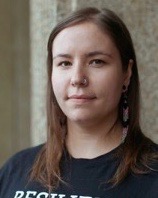 Rebecca Beaulne-Stuebing
Rebecca Beaulne-Stuebing Toronto |
Rebecca Beaulne-Stuebing (she/her) is Metis of the eagle clan with roots in Sault Ste. Marie and the Red River. She is First Degree Midewiwin in the Three Fires Midewiwin lodge and her family is registered with the Metis Nation of Ontario. Rebecca is currently completing a PhD in social justice education and Indigenous health at the University of Toronto, and facilitates mashkiki gitigaanan, an urban Indigenous plant medicine sovereignty project. |
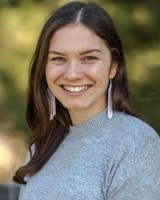 Olivia Franks
Olivia FranksQueen's |
Olivia Franks is a Kanien’kehá:ka from Wahta Mohawk Territory. She grew up in Wahta with her parents and sisters until moving to Kingston, Ontario to attend Queen’s University. Olivia is a daughter, sister, granddaughter, niece, cousin, friend, and student. She is currently working on her Master’s degree studying health promotion, under the supervision of Dr. Lucie Lévesque. Her research is in partnership with the Kahnawà:ke Schools Diabetes Prevention Project, which utilizes community-based participatory research to mobilize Indigenous communities across Canada for type 2 diabetes prevention and healthy living. Through her research, she hopes to contribute to knowledge translation interventions created by, with, and for Indigenous communities. Olivia’s career goals are to undertake Indigenous community-owned and participatory research that may inform public policy to support community needs and foster research sovereignty for Indigenous Nations. |
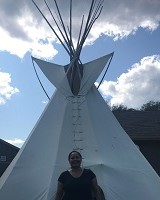 Andrea Martel
Andrea MartelToronto |
Andrea Martel is a nêhiýawiskwêw from Waterhen Lake First Nation, SK and has familial ties to Onion Lake First Nation, SK. She has a BA in Sociology from the University of Saskatchewan and a MEd degree in Counselling Psychology from the University of British Columbia. She is in her first-year of a PhD program in the Social and Behavioural Health Sciences stream at the University of Toronto Dalla Lana School of Public Health. Her research interest is in applying a nêhiýaw itâpisinowin framework and the use of digital media as a tool for community-based health promotion. |
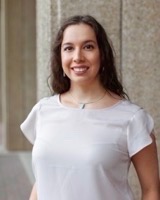 Shanna Peltier
Shanna PeltierToronto |
Shanna Peltier is a proud Anishinaabe kwe who grew up in Wiikwemkoong Unceded Territory located on the beautiful Mnidoo Mnis (Manitoulin Island), Ontario. Shanna is a Ph.D. student in the School and Clinical Child Psychology program at the Ontario Institute for Studies in Education (OISE) - University of Toronto. Under the supervision of Dr. Jeffrey Ansloos, she hopes to explore and conceptualize a critical stance on Indigenous mental health in the areas of suicide prevention and life promotion, especially as it pertains to Indigenous children and youth. Currently, she is conducting qualitative research with urban-based Indigenous youth wellness facilitators in British Columbia. This goal of this work is twofold: (1) to generate more complex and socio-politically entangled psychological theories of suicide with urban Indigenous youth that account for social (e.g. poverty) and historical (e.g. colonialism) dimensions, and, (2) to generate Indigenous youth-informed social actions which address colonial violence and promote wellbeing. She also holds various advisory and representative positions with the Centre for Addiction and Mental Health (CAMH), Ontario Indigenous Youth Partnership Project (OIYPP), and the First Nations Community of Inquiry & Praxis (FNCIP). As a passion project, Shanna is the co-host of an Indigenous student-led podcast entitled: Heartberry Podcast. |
Undergraduate Awardees
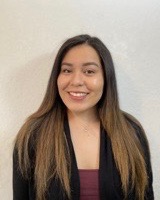 Alia Big George
Alia Big GeorgeWestern |
Boozhoo, My name is Alia Big George and I am from Anishinaabeg of Naongashiing. I will be going into my fourth year at Western University this fall, with an Honours Specialization in Health Studies. Over the past three years at Western, I have been actively involved around campus. During my second year, I was an Orientation Leader at Delaware Hall residence and was the Ally Commissioner for the Delaware Hall Student Council. In my third year, I was the Vice President Events on the Indigenous Students’ Association, and I am now the President going into my fourth year. In the future, I want to work in the healthcare field, while incorporating aspects of Indigenous health. I want to move back home to my Northern community, where I can continue participating in ceremonies. My goal is to advocate for the importance of spiritual health, and help provide services up North. |
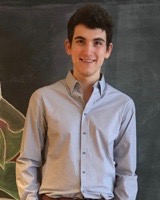 Félix Larocque
Félix LarocqueOttawa |
Félix Larocque is a member of the Mattawa/North Bay Algonquin First Nation. His spirit name is “Mino-zoongde’e: Kind Gentle Heart”. Enrolled at the University of Ottawa, he is a History and French undergraduate student in the Faculty of Arts. His long-term goal is to become a high school teacher. A very active person, he adores sports as well as school. He has represented his band at the “North American Indigenous Games”. He is also the Regional Mentor for Northern Ontario students at the University of Ottawa, whose mandate is to support newly enrolled students with their transition to university. Winner of the Lieutenant Governor’s Award for his exceptional volunteer work, he acted as mentor for 5 years at the Niigan Mosewak native awareness camp and as minister of Native affairs in his high school student council. His Franco-Ontarian identity is intimately linked to his Aboriginal identity; one cannot be separated from the other. Involved in awareness and reconciliation initiatives since early childhood, he has given multiple province wide workshops to youth. He is convinced that he can contribute to his surroundings and community by setting an example in his efforts towards Truth and Reconciliation. |
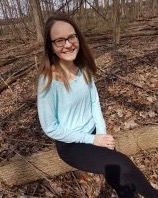 Kia Peters
Kia PetersWestern |
My name is Kia and I am an Anishnabee Kwe from Caldwell First Nation, Turtle clan. I recently graduated from my Master’s Degree in Physiology & Pharmacology and have returned to school to study nutrition sciences and dietetics with the goal of becoming a Registered Dietitian. My academic and spiritual path has largely been paved by my passion for Indigenous health and wellness and my never-ending thirst to understand what wellness truly means, especially in the context of Indigenous peoples. I have a vision that the wellness of our communities will prosper by bringing back and enhancing traditional knowledge of food and nutrition for the prevention and management of chronic diseases, such as obesity and diabetes. My long-term career goal is to facilitate transparent communication between the Canadian government and Indigenous communities to influence and write policies around food security and develop nutrition programing for Indigenous peoples. |
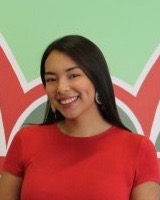 Tehya Quachegan
Tehya QuacheganWestern |
Tehya Quachegan is an Ililiwiskwew from Moose Cree First Nation and grew up in Thunder Bay, Ontario. She is currently in her 4th year at Western University completing a double major in Psychology and Indigenous Studies. Within the University, Tehya represents Indigenous Studies on the Social Science Students’ Council and the Indigenous Student Association and also holds a position within Student Energy’s Advocacy Portfolio. Tehya currently sits on Nishnawbe Aski Nation’s Oshkaatisak (All Young People's) Council which represents and provides opportunities to youth from the 49 First Nation communities in their northern region. Tehya plans to continue onto graduate studies to further study Psychology and focus her research on land-based healing. She is passionate about mental health work and building supports for Indigenous peoples, especially the youth. Her future goal is to work in northern communities where there is the largest gap in mental health supports and to help bridge that gap through a culturally inclusive and community-based practice. |
Seed Grant Awardee
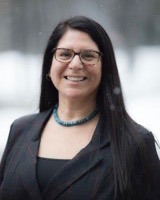 Lorrilee McGregor
Lorrilee McGregorNOSM |
Lorrilee McGregor is an Anishinaabe from Whitefish River First Nation on Manitoulin Island. She is an Assistant Professor at the Northern Ontario School of Medicine at Laurentian University in Sudbury where she teaches about Indigenous peoples’ health. Dr. McGregor has focussed her research on First Nation community health issues such as mental health and addictions, diabetes, physical activity, and nutrition. She has also worked with First Nation communities and organizations on program evaluation and strategic planning. For the past 18 years, Dr. McGregor has been an active member of the Manitoulin Anishinaabek Research Review Committee, a community research ethics committee, and has served as the Chair for most of that time. |


